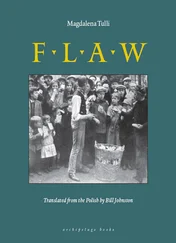Magdalena Tulli - In Red
Здесь есть возможность читать онлайн «Magdalena Tulli - In Red» весь текст электронной книги совершенно бесплатно (целиком полную версию без сокращений). В некоторых случаях можно слушать аудио, скачать через торрент в формате fb2 и присутствует краткое содержание. Год выпуска: 2011, Издательство: Archipelago Books, Жанр: Современная проза, на английском языке. Описание произведения, (предисловие) а так же отзывы посетителей доступны на портале библиотеки ЛибКат.
- Название:In Red
- Автор:
- Издательство:Archipelago Books
- Жанр:
- Год:2011
- ISBN:нет данных
- Рейтинг книги:3 / 5. Голосов: 1
-
Избранное:Добавить в избранное
- Отзывы:
-
Ваша оценка:
- 60
- 1
- 2
- 3
- 4
- 5
In Red: краткое содержание, описание и аннотация
Предлагаем к чтению аннотацию, описание, краткое содержание или предисловие (зависит от того, что написал сам автор книги «In Red»). Если вы не нашли необходимую информацию о книге — напишите в комментариях, мы постараемся отыскать её.
In this inventive novel, Magdalena Tulli creates a world that is unreal, yet strangely familiar and utterly convincing. Set in a mythical fourth partition of Poland,
is full of haunting descriptions of the town and its inhabitants; its power lies in Tulli's evocative, almost hallucinatory use of language.
In Red — читать онлайн бесплатно полную книгу (весь текст) целиком
Ниже представлен текст книги, разбитый по страницам. Система сохранения места последней прочитанной страницы, позволяет с удобством читать онлайн бесплатно книгу «In Red», без необходимости каждый раз заново искать на чём Вы остановились. Поставьте закладку, и сможете в любой момент перейти на страницу, на которой закончили чтение.
Интервал:
Закладка:
Rauch was intending to visit the black boy in the hospital. A plush teddy bear waited in the director’s office for its moment. But when that moment came, the orderlies were just covering him over — blacker than ever and thin as death — with a sheet bearing the hospital stamp. Rauch walked away with the teddy bear under his arm. From that time on the teddy bear got in the way wherever Rauch put it down.
During this time a white grand piano arrived in Stitchings in a huge wooden crate, a gift for Rauch, along with a bill of lading and an invoice that Rauch snatched up impatiently as perhaps being the long-awaited sign of life sent at last by Natalie Zugoff. But he learned only that the piano had been ordered by her long before, at the beginning of the season. He racked his brains in vain trying to figure out what had inspired this gesture. The Chinese lapdog slept in the pocket of his silk dressing gown, where Rauch kept it so as not to tread on it accidentally when, as he was wont, he would wonder through his apartment, leafing through books, rummaging among his musical scores, opening bottles of perfume. Tormented by insomnia and by questions to which there were no answers, in the night he would sit down at the white piano. The musical phrases he played would limp like wounded animals, retreating unsteadily, fading away, then returning with a painful, insistent question. Why this way? Was there nothing for anyone? The sounds made the Chinese lapdog nervous, and an inquiring whimper would come from the pocket of the dressing gown.
“Jamais,” Rauch would reply. “Now it’s certain. She’s not coming back.”
He would conclude this line with a tragic chord. His stiff fat fingers would not obey him; they danced across the keys without grace, exactly the way Natalie Zugoff had once tried to describe it. In the early morning Rauch wept bitterly and, kneeling, kissed the white legs of the piano.
The one consolation given to him he found in the Hotel Angleterre. The maître d’, bowing, would lead him to the best table. Over the soup Rauch would choose an entrée, explaining his wishes to the waiter between mouthfuls.
“Double helpings of everything,” he would remind him.
He devoured double portions, getting gravy on the hem of the white napkin tucked into his collar. Before dessert he would fix his inconsolable gaze on the menu and return to the appetizers. Finally, as he was drinking his coffee and finishing his torte, he would reach for the menu one last time and look it over sadly, not finding anything more to eat. “Why do you never have artichokes?” he would ask in the end reprovingly.
By now he was so heavy he no longer wished to bear the weight of his own body. Since the time he had accidentally stepped on the Chinese lapdog and killed it, hired porters carried him everywhere, along with the upholstered armchair in which he spent his time from morning till late at night. At one in the afternoon he would be brought to the restaurant of the Hotel Angleterre to have lunch. He was taken from there around three, even heavier than before, and transported to the theater, though not through the lobby, as he didn’t like to go that way, but instead through the side entrance that led to the dressing rooms. Dripping with sweat, the men lifted him and his chair up the narrow creaking stairs.
“Don’t tip it!” Rauch would shout when they stumbled on the cramped landings. Half dead from the strain, they carried him onto the apron, where he could direct a rehearsal of the new program as he finally dozed in peace. The porters would sit in the back row. Heads leaning against the back of the seat and mouths gaping open, they would catch some rest before their evening-time exertions: they had to endlessly move the armchair around the billiard table at Corelli’s café so Rauch could play his daily round with the chief of police.
During this time the police were taking an interest in the local bureau of an American typewriter company, which was located in the Hotel Angleterre. There was an office and also a storeroom; locked cases were stacked against the walls, people came and went, packages were brought in and taken away. During their morning rounds the maids would sweep up flax fibers and a dull-colored powder. The bureau manager was missing part of his ear and also three fingers on his right hand, which according to the police must have made it difficult for him to demonstrate the merits of the American typewriters. A search warrant was obtained, and the door of the room was broken down. The manager was sitting at the table in a dirty undershirt, a watchmaker’s magnifying glass in hand, tinkering with the innards of a music box.
“What’s all this, can’t a man take a look inside a music box?” he asked in a tearful voice. But he consented to open each case one by one. They contained brand-new, gleaming Remington typewriters. The invoices and licenses were in order. The Remington man giggled and offered the policemen American cigarettes. They each took one for later and set to work. They patted armchairs, moved wardrobes, crawled under the bed, while he blew perfect smoke rings that rose all the way up to the ceiling, and expressed mocking sympathy for the difficult lot of the copper. Despite everything they persevered. Their labors were rewarded — aside from a dozen or more dismantled music boxes lying around in disarray, they found an entire collection of flintlock pistols. They removed the weapons one by one from a hiding place behind the stove, each wrapped carefully in rags soaked in grease. The Remington man stopped joking around; the cigarette fell from his hand.
“Let’s go, Mr. Rączka,” the policemen exclaimed as they propelled him toward the door. In the hotel it was expected that the arrested man would immediately hang, but this did not come about. Someone swore they’d heard from a reliable source that the forensic experts split their sides laughing at the sight of von Treckow’s flintlocks. Before Adaś Rączka was released, a bomb exploded at the police station, tearing the chief of police himself to pieces. He did not exactly look good.
The Remington company’s hotel bill went unpaid. The desk clerk sold typewriters left and right under the counter. Mr. Lapidus preferred not to know anything about it. For at this time he was expecting a visit from Prince Belorukov-Mukhin. The prince, as his assistant had informed Lapidus by letter, desired to see the places where Natalie Zugoff had stayed, and to this end planned to sail to Stitchings from Buenos Aires on board the British liner the Commonwealth. But when this white craft, adorned with the flags of all the countries in the world, pulled into port, it transpired that neither the prince nor his assistant was on board, and the hotel automobile came back empty. An Argentine by the name of Pedro Alvarez walked from the port on foot, bowed under the weight of tripods and cameras. At the hotel he referred to the reservation made by the prince. According to the letter he presented at the reception desk, he was Prince Belorukov-Mukhin’s private photographer.
“Oh yes, prince have everything private,” he assured them in broken German. To compensate the proprietor of the hotel for his failure to appear, the prince had sent him a large portrait photograph in a gilt frame, signed with a flourish. He looked down from it with one bulging, lascivious eye. The other was covered with a black patch like a pirate’s.
Pedro Alvarez took a nail and a small hammer from his traveling case and personally hung the prince’s portrait over the reception desk, after which he showed them a Spanish-language newspaper in which, though they could not understand a word, they all could see the name of Natalie Zugoff outlined in mourning black.
“Funeral lovely as wedding,” the photographer recounted. “Was band, crowds, gold coffin, all covered in flowers white as snow, everyone cry.”
Читать дальшеИнтервал:
Закладка:
Похожие книги на «In Red»
Представляем Вашему вниманию похожие книги на «In Red» списком для выбора. Мы отобрали схожую по названию и смыслу литературу в надежде предоставить читателям больше вариантов отыскать новые, интересные, ещё непрочитанные произведения.
Обсуждение, отзывы о книге «In Red» и просто собственные мнения читателей. Оставьте ваши комментарии, напишите, что Вы думаете о произведении, его смысле или главных героях. Укажите что конкретно понравилось, а что нет, и почему Вы так считаете.












